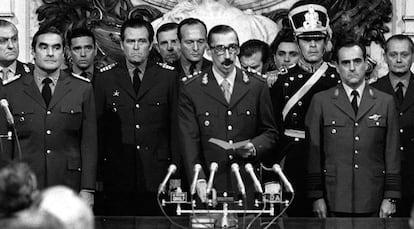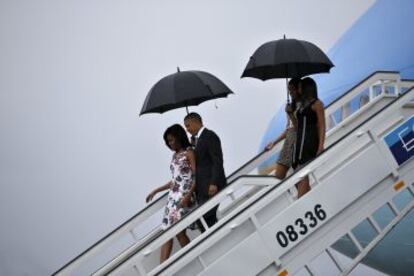US to declassify records on Argentina’s dictatorship
President Obama will seek to renew his country’s image when he travels to Buenos Aires after Cuba trip


Few countries better represent the United States’ turbulent history with Latin America than Argentina.
Many in the region who lived under military regimes in the 1970s suspect that the US government supported those in power. Yet American culture permeates those countries, and their people avidly follow everything that happens in their northern neighbor.
US President Barack Obama is fully aware of that dual reality, and has chosen to travel to Argentina after his historic trip to Cuba to refresh his country’s image in the region.
Obama and his team are carefully crafting the symbolic moment, the gesture, the language to break away from the United States’ tradition of military and CIA interventions in the region. The trip aims to recognize mistakes and pay tribute to victims of the regime.
Argentina still remembers the role former State Secretary Henry Kissinger played in the region in the 1970s
The president will visit the Parque de la Memoria – Remembrance Park – and deliver a speech about US-Latin American relations. Obama will likely speak about the 1970s military and intelligence campaign of repression known as Operation Condor.
Senior White House officials say the president will also declassify US military and intelligence records on Argentina’s “Dirty War,” which many historians believe will help explain American agencies’ roles and how the regime designed its plan to exterminate activists and guerrillas, as well as a program to remove newborns from women who gave birth while in prison.
“To underscore our shared commitment to human rights, the president will visit the Parque de la Memoria to honor the victims of Argentina’s ‘Dirty War’,” said National Security Advisor Susan E. Rice. “In addition to more than 4,000 documents that the United States has already released from that dark period, President Obama – at the request of the Argentinean government – will announce a comprehensive effort to declassify additional documents – including, for the first time, military and intelligence records. We believe this trip will be an historic and powerful demonstration of our nation’s new approach to Latin America.”

Last year, Pope Francis announced that the Vatican would open its archives on the dictatorship and the Catholic Church is working on a document to break with the past and honor the victims.
Argentina’s repressive regime made 30,000 people disappear and changed the country’s political landscape. Today, no one in Argentina would dare justify the military coup and even less after the Kirchner administrations have kept the issue in the foreground for the last 12 years. Every time someone goes off script, they are met with severe censure on all sides.
Obama’s trip will be the first official US presidential visit to Argentina in more than 10 years. The country has not always been welcoming to previous visiting US dignitaries: many still remember the role former State Secretary Henry Kissinger played in the region in the 1970s. During last year’s presidential campaign, President Mauricio Macri’s rivals painted his name on American flags.
Still, unlike his predecessor, George W. Bush, the current US president is well liked in Argentina. Thousands of demonstrators protested President Bush’s visit during the 2005 Summit of the Americas in Mar del Plata.
Last year, Pope Francis announced that the Vatican would open its archives on the dictatorship
In his efforts to renew diplomatic ties with the South American nation, Obama may meet with Estela de Carlotto, the leader of the Grandmothers of Plaza de Mayo organization, a heroine to victims, and a fierce critic of the United States and President Macri. She visited Remembrance Park two weeks ago with French President François Hollande and her grandson, Ignacio, whom her organization identified last year after a 36-year search. Ignacio was taken from his mother after she gave birth to him in prison.
Macri recently met the activist leader, promising that he would change nothing regarding the push for human rights, and that his administration would continue to try former officials of the military regime for crimes against humanity. In fact, the White House said it was Argentina’s government that asked for the documents to be declassified.
English version by Dyane Jean François.
Tu suscripción se está usando en otro dispositivo
¿Quieres añadir otro usuario a tu suscripción?
Si continúas leyendo en este dispositivo, no se podrá leer en el otro.
FlechaTu suscripción se está usando en otro dispositivo y solo puedes acceder a EL PAÍS desde un dispositivo a la vez.
Si quieres compartir tu cuenta, cambia tu suscripción a la modalidad Premium, así podrás añadir otro usuario. Cada uno accederá con su propia cuenta de email, lo que os permitirá personalizar vuestra experiencia en EL PAÍS.
¿Tienes una suscripción de empresa? Accede aquí para contratar más cuentas.
En el caso de no saber quién está usando tu cuenta, te recomendamos cambiar tu contraseña aquí.
Si decides continuar compartiendo tu cuenta, este mensaje se mostrará en tu dispositivo y en el de la otra persona que está usando tu cuenta de forma indefinida, afectando a tu experiencia de lectura. Puedes consultar aquí los términos y condiciones de la suscripción digital.








































